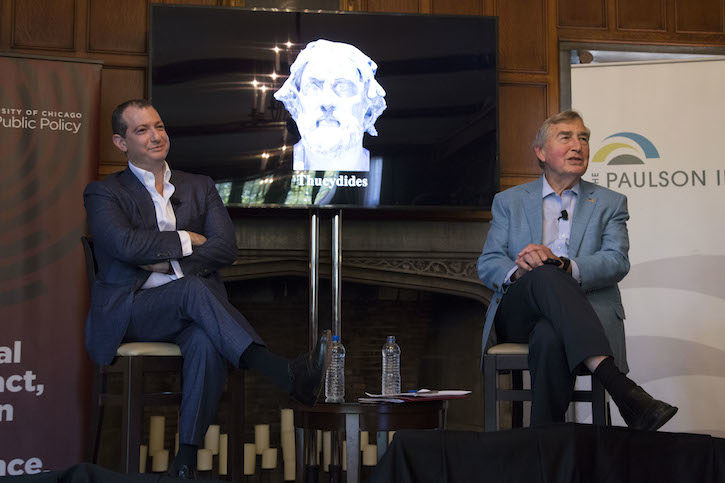The Paulson Institute welcomed political scientist and Harvard professor Graham Allison for a conversation about his new book, “Destined for War: Can America and China Escape Thucydides’s Trap?” as part of the Institute’s Contemporary China Speakers Series at the University of Chicago. As former Assistant Secretary of Defense to President Clinton, Mr. Allison earned the Defense Medal for Distinguished Public Service for his role in reducing the Soviet Union’s nuclear arsenal. Since then, he has served as Director of Harvard’s Belfer Center for Science and International Affairs, for which he is now a board member. The conversation was moderated by Institute Vice Chairman Evan Feigenbaum and was co-sponsored by Harris Public Policy and the Institute of Politics.
During his talk, Allison noted the rise of China as the most significant geopolitical event of the last 25 years, saying that “never before has a country risen so far, so fast, on so many dimensions.” He also predicted that the greatest geostrategic challenge of the next 25 years would be “the impact of the rise of China on the United States and the international order.” Addressing the question central to his book—whether the US and China are destined for war—Allison gave the answer “yes and no.” If the US and China consider Thucydides’ Trap and commit to learning from history rather than repeating it, then conflict could likely be avoided. However, if the two countries insist on business as usual, then we should expect history as usual: a catastrophic war.
Thucydides’ insight was not that the rising power thinks itself strong enough to instigate conflict and emerge victorious, Allison explained. Instead, amidst a geostrategic power struggle, a third-party action, unintended by either primary party, provokes them to react to one another and leads to conflict. Applied to modern geopolitics, this phenomenon has grave implications. While Allison addressed several mitigating factors seemingly keeping the threat of war between the two nations at bay, he mentioned Kim Jong Un as the “chief candidate” for this third-party role, and articulated a hypothetical chain of events in which North Korea’s nuclear provocations “drag the US and China into a war with each other that neither wanted.”




